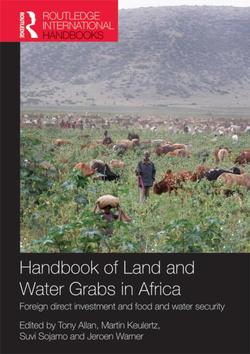Routledge | 23.8.2012
Handbook of Land and Water Grabs in Africa
Foreign direct investment and food and water security
Edited by John Anthony Allan, Martin Keulertz, Suvi Sojamo, Jeroen Warner
Published August 23rd 2012 by Routledge – 446 pages
According to estimates by the International Land Coalition based at the International Fund for Agricultural Development (IFAD), 57 million hectares of land have been leased to foreign investors since 2007. Current research has focused on human rights issues related to inward investment in land but has been ignorant of water resource issues and the challenges of managing scarce water. This handbook will be the first to address inward investment in land and its impact on water resources in Africa.
The geographical scope of this book will be the African continent, where land has attracted the attention of risk-taking investors because much land is under-utilised marginalized land, with associated water resources and rapidly growing domestic food markets. The successful implementation of investment strategies in African agriculture could determine the future of more than one billion people. An important factor to note is that sub-Saharan Africa will, of all the continents, be hit hardest by climate change, population growth and food insecurity. Sensible investment in agriculture is therefore needed, however, at what costs and at whose expense?
The book will also address the livelihoods theme and provide a holistic analysis of land and water grabbing in sub-Saharan Africa. Four other themes will addressed: politics, economics, the environment and the history of land investments in sub-Saharan Africa.
The editors have involved a highly diverse group of expert researchers, who will review the pro- and anti-investment arguments, geopolitics, the role of capitalist investors, the environmental contexts and the political implications of, and reasons for, leasing millions of hectares in sub-Saharan Africa. To date, there has been no attempt to review land investments through a suite of different lenses, thus this handbook will differ significantly from existing research and publication.
The editors are Tony Allan, (Professor Emeritus, Department of Geography, School of Oriental and African Studies and King’s College London); Jeroen Warner (Assistant Professor, Disaster Studies, University of Wageningen); Suvi Sojamo (PhD Researcher, Water and Development Research Group, Aalto University); and Martin Keulertz (PhD Researcher, Department of Geography, London Water Group, King’s College London).
Forthcoming
Land Grabbing and Global Governance
Edited by Matias E. Margulis, Nora McKeon, Saturnino Borras Jr.
To Be Published April 1st 2013 by Routledge – 192 pages
While land grabbing per se is not a new phenomenon having historical precedents in the eras of imperialism, the character, scale, pace, orientation and key drivers of the recent wave of land grabs is a distinct historical event closely tied to the changing dynamics of the global agri-food, feed and fuel complex.
Land grabbing is facilitated by ever greater flows of capital, goods, and ideas across borders and these flows occur through axes of power that is far more polycentric than the North-South imperialist tradition. Land grabs occur in the context of a changing character of the global food regime, which used to be anchored by North Atlantic empires; the integrated food-energy complex seems to be headed towards multiple centres of power, especially with the rise of the BRICS and the proliferation of middle income countries in many of these land transactions.
Land Grabbing and Global Governance offers insights from leading scholars and experts on contemporary land grabs. This volume is the first to examine land grabs in direct relation to a global economy undergoing profound change and the role of new configurations of power and resistance in governance institutions.
This book was published as a special issue of Globalizations.
Matias E. Margulis is Assistant Professor of International Studies at the University of Northern British Columbia. His current book project explores the global regulation of agricultural trade and food security. He is a former Canadian trade policy advisor and has worked on global food security policy at several multilateral organizations.
Nora McKeon studied history at Harvard and political science at the Sorbonne before joining the Food and Agriculture Organization (FAO) of the United Nations where she became responsible for the overall direction of FAO’s policy and programme interaction with civil society. She now divides her time between research, teaching and activism around food systems, peasant farmer movements and UN-civil society relations.
Saturnino M. Borras Jr. is Associate Professor at the International Institute of Social Studies (ISS) in The Hague, Adjunct Professor at the College of Humanities and Development Studies (COHD) of China Agricultural University in Beijing, and a Fellow of the Amsterdam-based Transnational Institute (TNI) and of the California-based Food First.














